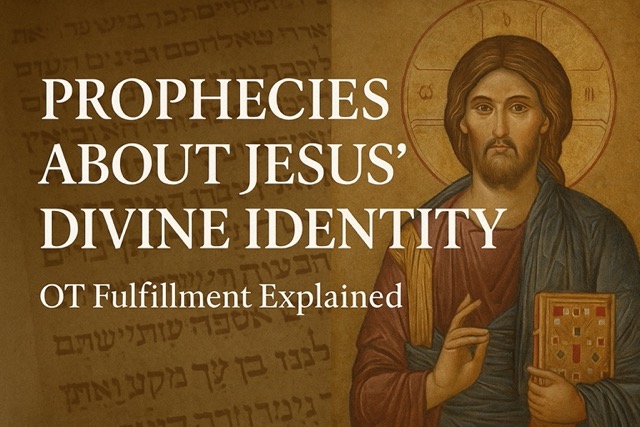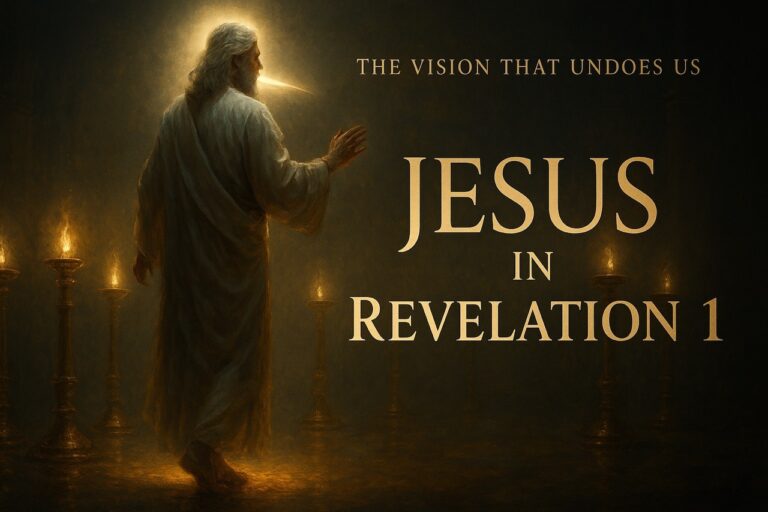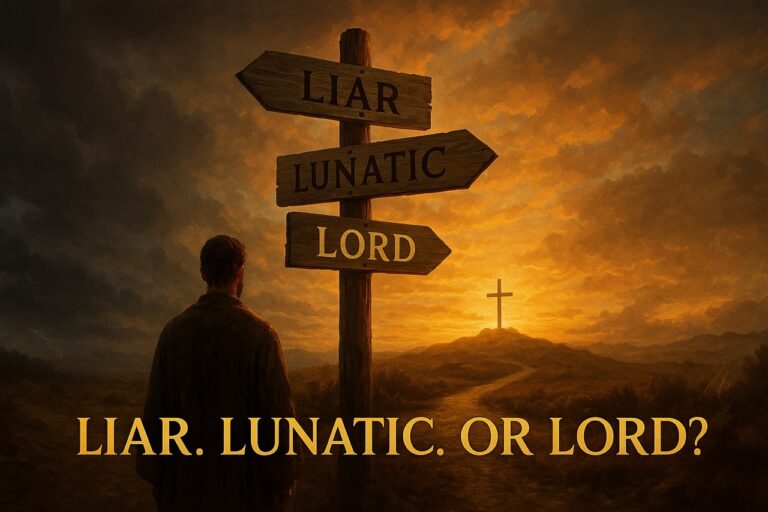The Old Testament contains dozens of prophecies about Jesus’ divine identity, revealing a Messiah who would be more than a man — God in the flesh.
Through royal psalms, wisdom texts, priestly promises, and prophetic visions, God foretold a Savior who would be His Son, eternal King, High Priest, and Redeemer. These passages — both direct predictions and symbolic foreshadows — point clearly to the incarnation and deity of Jesus Christ.
Renowned theologians affirm this. As Desiring God teaches, “All of Scripture points us to Christ.” Ligonier Ministries similarly notes that the Old Testament presents the Messiah as a divine Redeemer — not merely a future ruler.
In this study, we’ll examine some of the clearest messianic prophecies about Jesus’ divine identity, including:
- 📖 Psalm 2:7 — “You are My Son…”
- 📖 Isaiah 9:6 — “Mighty God… Everlasting Father”
- 📖 Psalm 110:1–4 — A priest forever at God’s right hand
- 📖 Proverbs 30:4, Daniel 9:25, Jeremiah 23:6, Zechariah 6:13, Micah 5:2–4
We’ll also explore messianic typology (e.g., David, Melchizedek), key Hebrew terms (e.g., El Gibbor, Yahweh Tsidkenu), and interpretations from both early church fathers and ancient Jewish traditions.
✝️ From Genesis to the prophets, the Bible prepares us for one truth: the Messiah would be God’s divine Son, come to save the world.
💀 They didn’t die for a lie.
See how all of Jesus’s disciples died — and what it proves.
Want the full breakdown of fulfilled messianic prophecy?
View our master guide: 351 Prophecies Jesus Fulfilled in Scripture →
✝️ Want to go EVEN deeper?
Explore the historical evidence of Jesus through ancient writings, Roman records, and archaeological discoveries that confirm His life and crucifixion. 🔍 Read the full article →
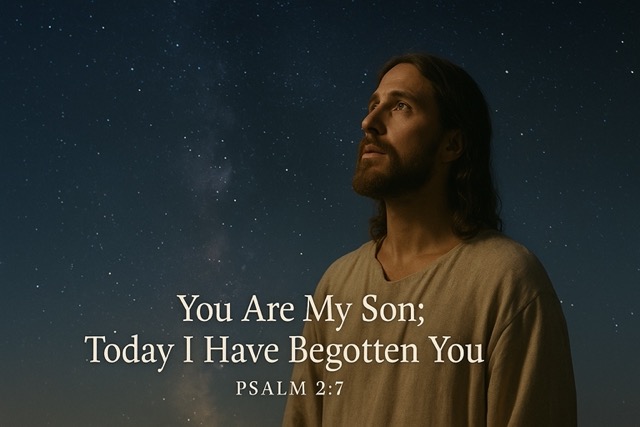
✝️ Prophecy Spotlight: Psalm 2:7 — “You Are My Son; Today I Have Begotten You”
🔍 Old Testament Insight
Psalm 2 is one of the most foundational royal Messianic prophecies in the Old Testament. At its core is a divine declaration:
“You are My Son; today I have begotten You.”
— Psalm 2:7
In Hebrew, the phrase “בְּנִי אַתָּה, אֲנִי הַיּוֹם יְלִדְתִּיךָ” (beni attah… hayom yelidticha) represents more than mere origin — it is a formal pronouncement of Sonship and enthronement. Originally applied to Israel’s Davidic kings, the verse prophetically reaches beyond earthly rulers to the eternal Son of God.
Jesus Himself alludes to this prophecy when He challenges the Pharisees in Matthew 22:43–45, asking how David could call the Messiah “Lord” if He were merely David’s son. It’s a theological hint at the divine nature of the Messiah — not just royalty, but deity.
✝️ New Testament Fulfillment
Psalm 2:7 echoes powerfully throughout the New Testament.
📍 At Jesus’ baptism and transfiguration, the Father’s voice from heaven proclaims:
“This is My beloved Son…”
(Matthew 3:17; Matthew 17:5)
📍 In Acts 13:33, Peter preaches that Jesus’ resurrection is the fulfillment of Psalm 2:7 — not as creation, but as inauguration of His kingship.
📍 The book of Hebrews makes this connection central:
- Hebrews 1:5 and 5:5 both quote Psalm 2:7 to affirm Jesus’ divine Sonship and High Priestly calling.
- These verses directly link Psalm 2:7 with Psalm 110:4, presenting Jesus as King-Priest forever — exalted and enthroned.
🧠 Scholarly Commentary
L. Michael Morales writes:
“The author of Hebrews utilizes Psalm 2:7 to develop the glory of Christ as the exalted High Priest.”
(Biblical Theology, Ligonier)
Dr. J.V. Fesko explains:
“Psalm 2’s immediate focus is the Davidic king, but it looks beyond David… to his greatest Son — who is also God’s Son.”
(Ligonier Ministries)
❗ Theological Clarification
Some cult groups mistakenly use “begotten” in Psalm 2:7 to deny Jesus’ eternal preexistence. But Scripture and scholarship are clear:
- The word “begotten” in context refers to enthronement, not origin.
- It reflects the Father’s formal declaration of divine Sonship, not biological creation.
Walt Russell (Talbot School of Theology) emphasizes:
“Psalm 2:7 is not about birth — it’s about the coronation of God’s eternal Son.”
📖 Cross-References & Fulfillment
| Prophecy Focus | Old Testament Verse | New Testament Fulfillment |
|---|---|---|
| Declared as God’s Son | Psalm 2:7 | Matthew 3:17; Hebrews 1:5; Acts 13:33 |
| Enthroned as King & Priest | Psalm 2:7 + Psalm 110:4 | Hebrews 5:5–6; Acts 2:30–36 |

✝️ Prophecy Spotlight: Isaiah 9:6–7 — “Wonderful Counselor… Mighty God, Everlasting Father”
🔍 Old Testament Insight
Isaiah 9:6 contains one of the clearest and most exalted declarations of the Messiah’s divine identity in the Old Testament:
“For to us a Child is born, to us a Son is given…
and His name shall be called Wonderful Counselor, Mighty God,
Everlasting Father, Prince of Peace.”
— Isaiah 9:6
This remarkable list of titles reveals the multifaceted nature of the coming Savior — both divine and eternal, ruling in peace and wisdom.
Let’s break down each title:
- El Gibbor (אֵֽל־גִּבּוֹר) — “Mighty God”
Literally means “God-Hero” or “Divine Warrior.” This same title appears in Isaiah 10:21, where it clearly refers to Yahweh, confirming that the Messiah shares in God’s nature. - Wonderful Counselor —
Speaks to divine wisdom, supernatural insight, and perfect guidance — far beyond human leadership. - Everlasting Father (Avi-‘ad) —
Not a reference to God the Father, but to the Messiah’s eternal, father-like rule as a protective and benevolent King. - Prince of Peace —
Points to His coming reign of justice, wholeness, and spiritual reconciliation, fulfilling the peace promised throughout prophetic scripture.
🧠 Theological Commentary
Sinclair Ferguson (Ligonier Ministries) comments:
“The Lord would enter history and reign in human flesh… Perhaps the most notable name: ‘Mighty God.’”
John MacArthur (Grace to You) explains:
“A Son will be given” implies His preexistent deity. He was already God before He was given to us as Savior.
These titles — declared centuries before Jesus’ birth — leave no doubt: the coming Messiah would be fully divine, eternally reigning, and supernaturally wise.
✝️ New Testament Fulfillment
The New Testament directly applies Isaiah 9:6 to Jesus, affirming His identity as God in the flesh:
📍 Luke 1:32–33 — The angel Gabriel tells Mary that her child will be called “Son of the Most High” and will reign forever on David’s throne.
📍 Titus 2:13 — Paul describes Jesus as “our great God and Savior,” echoing Isaiah’s divine language.
📍 Matthew 1:23 — Refers to Jesus as “Immanuel,” which means “God with us” — another direct link to Isaiah’s prophecy.
📍 Revelation 5:12 — Jesus is worshipped as “Worthy… to receive power and glory,” mirroring the honor due to the “Mighty God” of Isaiah 9:6.
📍 Athanasius, defending Christ’s deity in the 4th century, cited Isaiah 9:6 as irrefutable proof that Jesus is God incarnate and ruler forever.
📖 Cross-References & Fulfillment
| Prophecy Focus | Old Testament Verse | New Testament Fulfillment |
|---|---|---|
| Divine Identity & Reign | Isaiah 9:6–7 | Luke 1:32–33; Titus 2:13; Revelation 5:12 |
| God With Us (Immanuel) | Isaiah 7:14; 9:6 | Matthew 1:23 |
| Eternal Kingship from David’s Line | Isaiah 9:7 | Luke 1:32–33; 2 Samuel 7:13 (linked) |

✝️ Prophecy Spotlight: Psalm 110:1,4 — “The LORD Said to My Lord…”
🔍 Old Testament Insight
Psalm 110 is the most quoted Old Testament passage in the New Testament — and for good reason. It powerfully reveals both the divine authority and eternal priesthood of the Messiah.
“The LORD said to my Lord:
‘Sit at My right hand
until I make Your enemies Your footstool.’”
— Psalm 110:1
In this verse, David hears Yahweh (the LORD) speaking to Adonai (my Lord) — a profound moment where Israel’s greatest king refers to someone greater than himself as “Lord.” This points to a divine Messiah, not merely a human descendant.
Verse 4 adds another extraordinary declaration:
“You are a priest forever, according to the order of Melchizedek.”
— Psalm 110:4
Unlike the Levitical priesthood descended from Aaron, this priesthood is eternal, rooted in Melchizedek — the mysterious priest-king of Salem from Genesis 14. The Messiah would not only reign — He would intercede forever.
🧠 Theological Commentary
Jesus Himself cited Psalm 110:1 in Matthew 22:44 to silence the Pharisees and prove that the Messiah is not merely David’s son — but David’s Lord.
Justin Dillehay (The Gospel Coalition) writes:
“David refers to someone else as his ‘Lord’… which means he recognized this figure as divine.”
Psalm 110:4 is foundational to the Book of Hebrews, which presents Jesus as:
- “A priest forever…”
- With “the power of an indestructible life.”
(Hebrews 7:16–17)
This means that Jesus’ priesthood is unbreakable, superior, and divinely appointed — a perfect fulfillment of the prophetic order of Melchizedek.
✝️ New Testament Fulfillment
Psalm 110 is fulfilled repeatedly throughout the New Testament, affirming Jesus’ exalted role as both King and Priest:
📍 Acts 2:34–36 — Peter proclaims Jesus as “both Lord and Christ,” directly quoting Psalm 110:1 during Pentecost.
📍 Hebrews 5:5–6 — Links Psalm 2:7 and Psalm 110:4, establishing Jesus’ identity as the eternal High Priest.
📍 Hebrews 7:21 — Emphasizes that God Himself swore an oath, appointing Jesus according to Psalm 110:4.
📍 Mark 12:36 — Jesus quotes David’s words to affirm His own divine lordship.
📍 Revelation 5:6–10 — Jesus is seen at the center of the throne, worshiped as the Lamb and High Priest, interceding for the nations — fulfilling both royal and priestly offices.
📖 Cross-References & Fulfillment
| Prophecy Focus | Old Testament Verse | New Testament Fulfillment |
|---|---|---|
| Divine King with Eternal Rule | Isaiah 9:6–7 | Luke 1:32–33; Titus 2:13; Revelation 5:12 |
| Priest Forever (Melchizedek) | Psalm 110:4 | Hebrews 7:16–21; Hebrews 5:6 |
| Messiah at God’s Right Hand | Psalm 110:1 | Matthew 22:44; Acts 2:34–36; Revelation 5:6–10 |

✝️ Prophecy Spotlight: Isaiah 9:6–7 — “Wonderful Counselor… Mighty God, Everlasting Father”
🔍 Old Testament Insight
Isaiah 9:6 offers one of the clearest declarations of the Messiah’s divine identity in the Hebrew Scriptures:
“For to us a Child is born, to us a Son is given…
and His name shall be called Wonderful Counselor, Mighty God,
Everlasting Father, Prince of Peace.”
— Isaiah 9:6
Each of these titles carries deep theological weight, revealing not just the roles of the Messiah — but His divine nature:
- El Gibbor (אֵֽל־גִּבּוֹר) — “Mighty God”
Literally means “God-Hero” or “Divine Warrior.” This same term is used in Isaiah 10:21 to describe Yahweh, confirming that the Messiah is divine. - Wonderful Counselor
Indicates supernatural wisdom, divine insight, and perfect leadership — qualities only attributed to God Himself. - Everlasting Father (Avi-‘ad)
Not a confusion with God the Father in Trinitarian theology, but a description of the Messiah’s eternal kingship and father-like care over His people. - Prince of Peace
Foreshadows Jesus’ reign of justice, spiritual reconciliation, and true shalom — peace between God and man.
🧠 Theological Commentary
Sinclair Ferguson (Ligonier Ministries) explains:
“The Lord would enter history and reign in human flesh…
Perhaps the most notable name: ‘Mighty God.’”
John MacArthur (Grace to You) writes:
“‘A Son will be given’ implies His preexistence.
Jesus was already God before He was given to us as Savior.”
These names are not metaphors. They are prophetic titles of divine authority, spoken 700 years before Christ’s birth. The Messiah would be fully God, eternally sovereign, and perfectly wise.
✝️ New Testament Fulfillment
The New Testament affirms Isaiah 9:6 as directly fulfilled in Jesus Christ — identifying Him as both divine and eternal:
📍 Luke 1:32–33 — Gabriel tells Mary that her child will be called “Son of the Most High” and will reign forever on David’s throne.
📍 Titus 2:13 — Paul describes Jesus as “our great God and Savior,” echoing Isaiah’s title “Mighty God.”
📍 Matthew 1:23 — Jesus is called Immanuel, meaning “God with us”, fulfilling both Isaiah 7:14 and 9:6.
📍 Revelation 5:12 — Jesus is worshiped in heaven, described as “Worthy… to receive power and glory,” confirming His divine status.
📍 Athanasius (early church father) famously used Isaiah 9:6 to defend the deity of Christ against Arianism — calling Jesus eternal, divine, and uncreated.
📖 Cross-References & Fulfillment
| Prophecy Focus | Old Testament Verse | New Testament Fulfillment |
|---|---|---|
| Divine Identity & Eternal Rule | Isaiah 9:6–7 | Luke 1:32–33; Titus 2:13; Revelation 5:12 |
| God With Us (Immanuel) | Isaiah 7:14; 9:6 | Matthew 1:23 |
| Reign on David’s Throne | Isaiah 9:7 | Luke 1:32; 2 Samuel 7:12–13 (messianic covenant lineage link) |
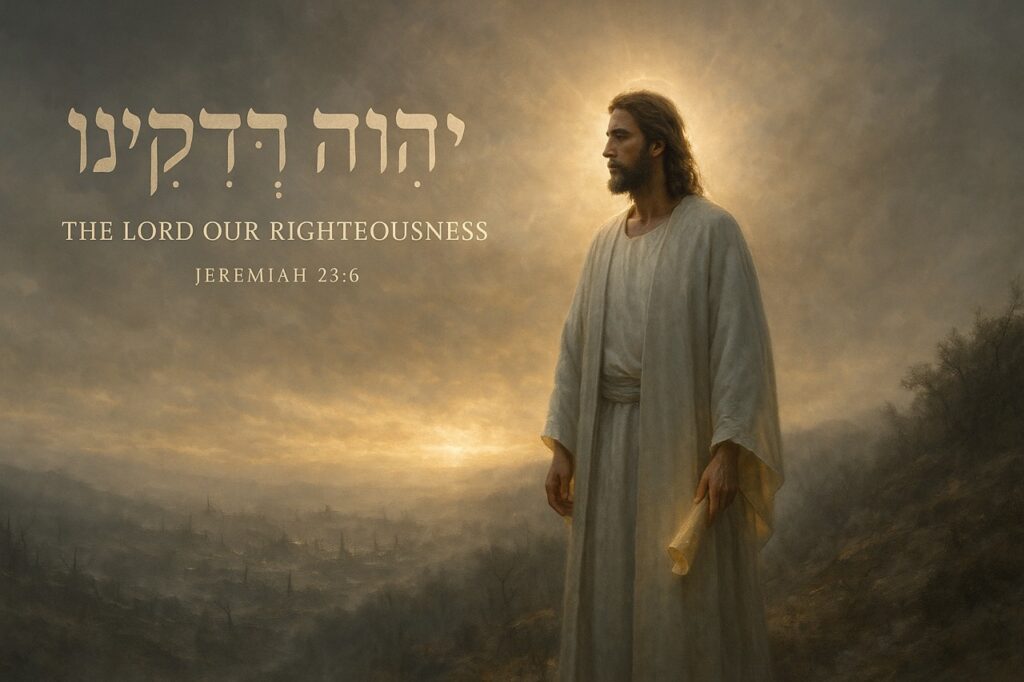
✝️ Prophecy Spotlight: Jeremiah 23:6 — “The LORD Our Righteousness”
🔍 Old Testament Insight
In a time of corrupt leadership and spiritual failure, the prophet Jeremiah proclaims a stunning promise of hope — a coming Messiah-King who will reign in righteousness:
“And this is the name by which He will be called:
The LORD Our Righteousness.”
— Jeremiah 23:6
This name in Hebrew is Yahweh Tsidkenu (יְהוָ֥ה צִדְקֵֽנוּ) — literally, “The LORD is our righteousness.”
It’s one of the most directly divine titles given to the Messiah in all of prophecy.
Unlike other names or attributes, this one combines:
- God’s covenant name — Yahweh
- With His perfect moral nature — righteousness (tsedeq)
This isn’t merely a righteous king ruling on God’s behalf. This is a King who is righteousness — God Himself in human flesh, securing righteousness for His people.
It’s also a sharp contrast to Zedekiah, Judah’s last king, whose name ironically meant “Yahweh is righteous” — but whose reign ended in exile and judgment.
🧠 Theological Commentary
Charles Spurgeon preached:
“Jesus is Jehovah our Righteousness.
We are accepted not through our own merit, but through Him.”
John MacArthur affirms:
“This name affirms both the Messiah’s deity and the doctrine of imputed righteousness — Christ becomes our righteousness before God.”
This prophecy isn’t just poetic language. It is a direct affirmation of the divine identity of the Messiah — and the core of the gospel itself. The Messiah does not merely teach righteousness — He becomes it for us.
✝️ New Testament Fulfillment
The New Testament directly applies Jeremiah 23:6 to Jesus Christ, revealing Him as the one who fulfills the name Yahweh Tsidkenu:
📍 Romans 10:4 — “Christ is the end of the law for righteousness to everyone who believes.”
📍 1 Corinthians 1:30 — “Christ Jesus… became for us righteousness, sanctification, and redemption.”
📍 Philippians 3:9 — Paul rejoices in “the righteousness from God that comes through faith in Christ.”
Through His perfect obedience, atoning death, and resurrected life, Jesus becomes our righteousness before God. His divine name — Yahweh Tsidkenu — is fulfilled in both identity and action.
📖 Cross-References & Fulfillment
| Prophecy Focus | Old Testament Verse | New Testament Fulfillment |
|---|---|---|
| Messiah as Righteous Savior | Jeremiah 23:6 | Romans 10:4; 1 Corinthians 1:30; Philippians 3:9 |
| Divine Name “Yahweh Tsidkenu” | Jeremiah 23:6 | Applied to Christ as source of righteousness (Spurgeon, MacArthur) |
| Imputed Righteousness | Jeremiah 23:6 | Romans 3:21–26; 2 Corinthians 5:21 |
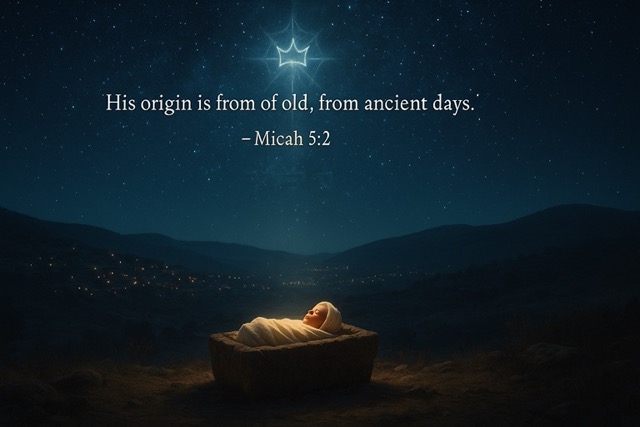
✝️ Prophecy Spotlight: Micah 5:2–4 — “His Origins Are from Ancient Days”
🔍 Old Testament Insight
In the midst of political turmoil and prophetic warning, Micah offers a moment of stunning messianic clarity. He foretells the exact birthplace and eternal nature of the coming ruler:
“But you, O Bethlehem Ephrathah…
from you shall come forth for Me
one who is to be ruler in Israel,
whose origin is from of old, from ancient days.”
— Micah 5:2
This prophecy is far more than a geographical clue. It combines earthly fulfillment with eternal identity:
- Bethlehem ties the Messiah to the royal line of David (cf. 1 Samuel 16:1), fulfilling God’s covenant promise of a king from David’s house.
- The phrase “from ancient days” (מִקֶּדֶם מִימֵי עוֹלָם) is often used in Scripture to describe eternity or divine preexistence. (See Psalm 90:2 — “from everlasting to everlasting, You are God.”)
Micah later adds:
“He shall stand and shepherd His flock in the strength of the LORD…
and He shall be their peace.”
— Micah 5:4–5
This ruler is no ordinary political figure. He is a divine Shepherd-King, eternal in origin, and bringer of peace and security for His people.
🧠 Theological Commentary
Matthew Henry writes:
“The goings forth of Christ were from everlasting; He was in the beginning with God.”
John Piper explains:
“Micah reveals a Messiah who is both born in time and existing before time.
He steps into history from eternity.”
Even Jewish interpreters before Christ viewed Micah 5:2 as a Messianic prophecy.
The Targum Jonathan, a pre-Christian Aramaic paraphrase, renders this passage:
“From you shall come forth before Me the Messiah.”
This affirms that the Messiah would not be a created being, but eternally existing — stepping into human history with divine authority and purpose.
✝️ New Testament Fulfillment
Micah’s prophecy is explicitly fulfilled in the life and identity of Jesus Christ:
📍 Matthew 2:5–6 — When Herod seeks to know where the Messiah will be born, his scribes quote Micah 5:2 directly.
📍 Luke 2:4–7 — Jesus is born in Bethlehem, exactly as foretold, in the city of David.
📍 John 7:42 — The crowd debates, saying: “Does not Scripture say that the Christ comes from Bethlehem?”
Even common people knew Micah’s prophecy.
But the fulfillment goes even deeper — to Jesus’ divine origin:
📍 John 8:58 — Jesus declares, “Before Abraham was, I AM.”
A direct claim to eternal existence, echoing both Micah 5:2 and Exodus 3:14.
📍 Colossians 1:17 — Paul writes, “He is before all things, and in Him all things hold together.”
Jesus isn’t just from ancient days — He is the eternal One.
📖 Cross-References & Fulfillment
| Prophecy Focus | Old Testament Verse | New Testament Fulfillment |
|---|---|---|
| Messiah’s Birthplace | Micah 5:2 | Matthew 2:5–6; Luke 2:4–7; John 7:42 |
| Eternal Preexistence | Micah 5:2 | John 8:58; Colossians 1:17; John 1:1–3 |
| Shepherd of Israel & Peace-Giver | Micah 5:4 | John 10:11; Hebrews 13:20; Ephesians 2:14 |
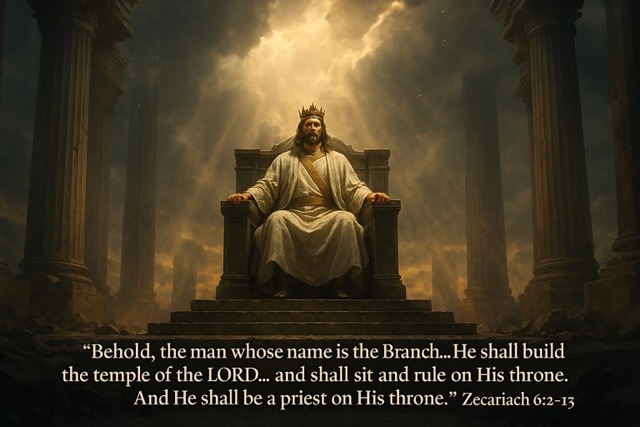
✝️ Prophecy Spotlight: Zechariah 6:12–13 — “The Branch… a Priest on His Throne”
🔍 Old Testament Insight
In a vision rich with symbolism and divine promise, Zechariah delivers one of the most unique and mysterious Messianic prophecies in all of Scripture:
“Behold, the man whose name is the Branch…
He shall build the temple of the LORD…
and shall sit and rule on His throne.
And He shall be a priest on His throne.”
— Zechariah 6:12–13
This prophecy is astonishing for its merging of two sacred roles:
- In ancient Israel, kings came from the tribe of Judah, and priests from Levi — their duties strictly separated.
- Yet here, Zechariah describes one man who will be both king and priest, seated on a single throne.
The figure is called “the Branch” (Hebrew: tsemach — צֶמַח), a title used in other Messianic prophecies:
- Isaiah 11:1 — “A shoot will come up from the stump of Jesse…”
- Jeremiah 23:5 — “I will raise up for David a righteous Branch…”
In Zechariah’s vision, this Branch doesn’t just restore the temple — He builds the true temple of the Lord, rules in glory, and serves as High Priest. The Messiah will unite governance and grace, kingship and atonement, in one eternal office.
🧠 Theological Commentary
Charles Feinberg, a Messianic Jewish scholar, notes:
“Only in the Messiah do we find the unique union of priesthood and kingship.”
Even the Talmud (Sukkah 52a) and Second Temple Jewish writings recognized that “the Branch” referred to the Messianic King.
The Book of Hebrews takes Zechariah’s imagery and applies it directly to Jesus — a High Priest not after Levi, but after Melchizedek, enthroned at the right hand of God.
Hebrews 7:16–17 emphasizes that Jesus holds His priesthood “by the power of an indestructible life.”
✝️ New Testament Fulfillment
Zechariah’s prophecy finds clear fulfillment in the life, death, resurrection, and exaltation of Jesus Christ:
📍 Luke 1:32–33 — Gabriel announces that Jesus will receive the throne of David and reign forever — the Messianic King.
📍 Hebrews 8:1 — Jesus is now “seated at the right hand of the throne of the Majesty in heaven”, acting as High Priest — a literal priest on a throne.
📍 Revelation 5:6–10 — Jesus appears as the Lamb who was slain, now reigning and interceding for the nations — the perfect union of priesthood and kingship.
In Jesus, the Branch has come. He rules with divine authority and intercedes with divine mercy — exactly as Zechariah foresaw.
📖 Cross-References & Fulfillment
| Prophecy Focus | Old Testament Verse | New Testament Fulfillment |
|---|---|---|
| Messiah as King-Priest | Zechariah 6:12–13 | Hebrews 8:1; Revelation 5:6–10 |
| The Branch — Royal Line of David | Zechariah 6:12; Jer 23:5 | Luke 1:32–33; Isaiah 11:1 |
| Priesthood on the Throne | Zechariah 6:13 | Hebrews 7:16–17; Hebrews 4:14–16 |
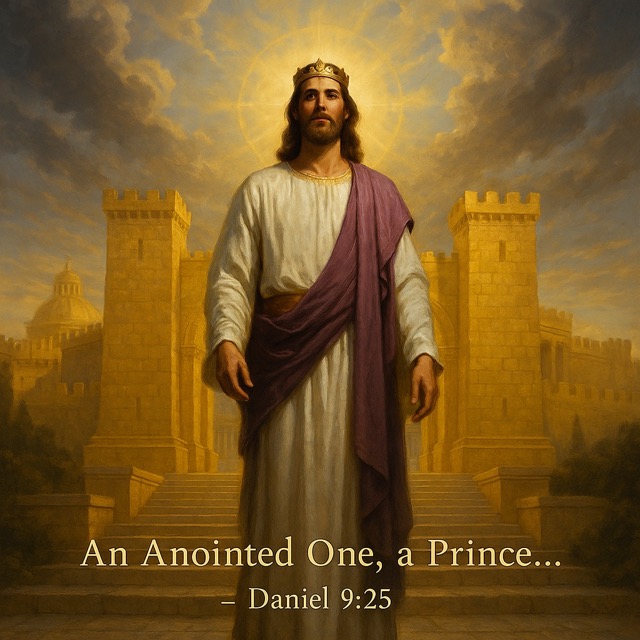
✝️ Prophecy Spotlight: Daniel 9:25 — “An Anointed One, a Prince…”
🔍 Old Testament Insight
In the midst of exile and prayerful pleading, Daniel receives a prophecy that lays out one of the most precise Messianic timelines in all of Scripture — the Seventy Weeks Prophecy:
“Know therefore and understand
that from the going out of the word to restore and build Jerusalem
to the coming of an Anointed One, a Prince,
there shall be seven weeks and sixty-two weeks…”
— Daniel 9:25
The Hebrew title for Anointed One is Mashiach (מָשִׁיחַ) — the very basis for our word Messiah.
This Anointed Prince is not just chosen — He is divinely commissioned to bring about the mission described in Daniel 9:24:
- To finish transgression
- To atone for iniquity
- To bring in everlasting righteousness
- To confirm covenant promises
The prophecy outlines a specific timeline from the command to rebuild Jerusalem to the appearance — and eventual cutting off — of the Messiah (v. 26), placing this divine event within history.
🧠 Theological Commentary
Dr. Gleason Archer (Daniel scholar) writes:
“The Messiah would appear and be ‘cut off’ (v. 26) before the second temple’s destruction…
The time frame matches Jesus’ ministry.”
This prophecy’s timeline, using ancient Jewish calendars and historical events (such as the decree of Artaxerxes in 445 B.C.), has been studied by Christian scholars to align remarkably with the time of Jesus’ crucifixion.
Even early Jewish commentators, including Rashi, considered that this Anointed One could refer to the Messiah — though later interpretations often de-emphasized that view.
Jesus Himself alluded to this prophetic clock in Mark 1:15:
“The time is fulfilled, and the kingdom of God is at hand…”
✝️ New Testament Fulfillment
The New Testament confirms that Daniel 9:25 points directly to Jesus Christ, whose public ministry and sacrificial death fulfilled both the mission and timing of this prophecy:
📍 Matthew 26:64 — Jesus references Daniel’s visions of the Son of Man, saying He will come on the clouds of heaven, just as seen in Daniel 7:13–14.
📍 Luke 24:44 — Jesus declares that everything written about Him in “the Law of Moses, the Prophets, and the Psalms” must be fulfilled — including Daniel.
📍 Acts 3:18 — Peter boldly preaches: “God fulfilled what He foretold through all the prophets — that His Messiah would suffer.”
Jesus not only appeared at the appointed time — He was “cut off” (Daniel 9:26) through crucifixion and brought about atonement and righteousness, exactly as prophesied.
📖 Cross-References & Fulfillment
| Prophecy Focus | Old Testament Verse | New Testament Fulfillment |
|---|---|---|
| Arrival of the Anointed One (Messiah) | Daniel 9:25 | Mark 1:15; Luke 2:25–32 |
| Suffering Messiah “cut off” | Daniel 9:26 | Acts 3:18; Isaiah 53; Matthew 27:50 |
| Messianic Mission Fulfilled | Daniel 9:24 | Romans 5:9–11; Hebrews 9:12–15 |
| Divine Timeline Completion | Daniel 9:25 | Galatians 4:4 — “When the fullness of time had come…” |
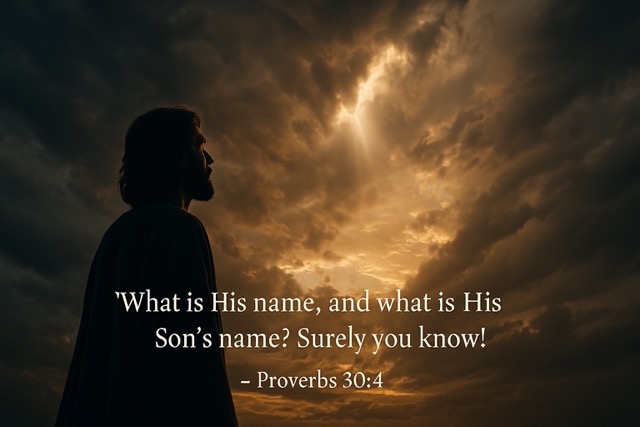
✝️ Prophecy Spotlight: Proverbs 30:4 — “What Is His Son’s Name?”
🔍 Old Testament Insight
Tucked within the poetic riddles of Proverbs comes one of the most surprising and profound questions in all of Hebrew wisdom literature:
“Who has ascended to heaven and come down?
Who has gathered the wind in His fists?
Who has wrapped up the waters in a garment?
Who has established all the ends of the earth?
What is His name, and what is His Son’s name? Surely you know!”
— Proverbs 30:4
This passage breaks pattern. It doesn’t just speak of God’s divine power over nature — it ends with a question of divine identity:
“What is His name… and what is His Son’s name?”
At the time this was written, no one claimed to know. Yet it implies that God has a Son — and that this Son shares in divine authority:
ascending, descending, commanding wind and water, and ruling the earth.
Ancient interpreters (both Jewish and Christian) viewed this as a veiled messianic reference, a mystery waiting to be revealed through divine revelation.
🧠 Theological Commentary
John Owen, the Puritan theologian, called this:
“A profound mystery — revealing that God had a Son before Bethlehem.”
C.S. Lewis remarked that the Old Testament is often like “God whispering a secret…”
— one that only becomes clear in the New Testament.
The language of Proverbs 30:4 mirrors that of later messianic declarations.
It’s not metaphor — it’s prophecy. The question is real: “Who is the Son of God?”
✝️ New Testament Fulfillment
The New Testament does not hesitate to answer what Proverbs left unsolved:
📍 John 3:13 — “No one has ascended into heaven except He who descended from heaven — the Son of Man.”
Jesus echoes Proverbs 30:4 directly — and answers it with His own identity.
📍 John 1:14 — “The Word became flesh and dwelt among us…
We have seen His glory, the glory as of the One and Only Son.”
📍 John 3:16–17 — “For God so loved the world, that He gave His only Son…
that the world might be saved through Him.”
Jesus claims to be the One who came down from heaven, who knows the Father, and who shares in divine glory. The riddle in Proverbs finds its fulfillment in Christ alone.
📖 Cross-References & Fulfillment
| Prophecy Focus | Old Testament Verse | New Testament Fulfillment |
|---|---|---|
| God’s Son foreshadowed | Proverbs 30:4 | John 1:14; John 3:13–17 |
| Ascending/descending imagery | Proverbs 30:4 | John 3:13; Ephesians 4:9–10 |
| Revelation of divine Sonship | Proverbs 30:4 | Matthew 17:5; John 5:19–23 |
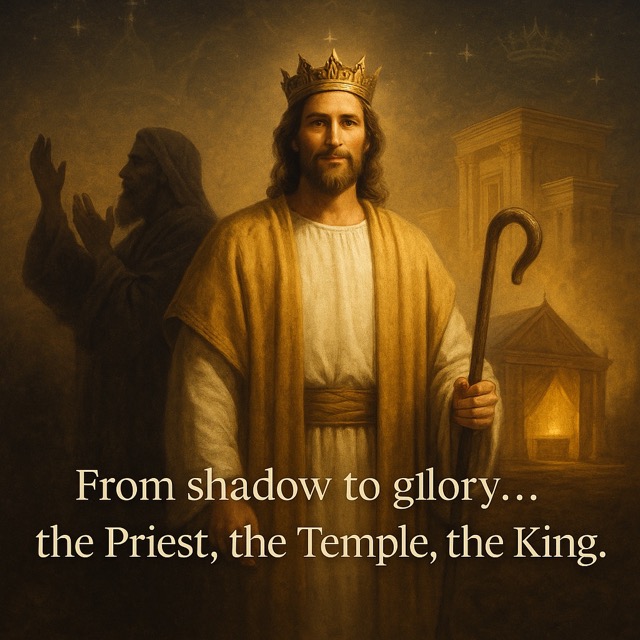
🪔 Typological Foreshadowing of Jesus’ Divine Identity
Not all prophecies in the Old Testament speak with direct voice — some whisper through sacred roles, objects, and patterns. These types serve as theological signposts: real people and places that prefigure the Messiah and reveal His divine nature.
Each foreshadow points to Jesus not merely as a representative of God… but as God in human form — the eternal King, the divine High Priest, and the true Tabernacle of glory.
👑 Melchizedek — The Eternal Priest-King
Genesis 14:18–20 — “Melchizedek, King of Salem… priest of God Most High.”
- Melchizedek blesses Abraham and receives tithes — yet appears with no genealogy, no beginning or end.
- Psalm 110:4 proclaims: “You are a priest forever, in the order of Melchizedek.”
- Hebrews 7:3 says he is “without father or mother… resembling the Son of God.”
🧠 Typological Insight:
Melchizedek is a divine mystery — both king and priest, appointed by God, not lineage.
He foreshadows Jesus’ eternal priesthood, divine sonship, and unique office as High Priest and King.
🐑 The Tabernacle and Temple — God Dwelling Among Us
Exodus 25–40 — The tabernacle was God’s dwelling place in the wilderness.
1 Kings 8:10–11 — God’s glory fills Solomon’s temple.
- These structures represented God’s presence on earth — temporary and veiled.
- John 1:14 declares: “The Word became flesh and dwelt [tabernacled] among us.”
- John 2:19 — Jesus said, “Destroy this temple, and in three days I will raise it up.”
🧠 Typological Insight:
The tabernacle and temple were types of Christ — temporary shadows of the true presence of God in human form.
Jesus is now the eternal temple, where heaven and earth meet.
🧑🌾 David — The Shepherd-King
2 Samuel 7:12–14 — God promises a descendant of David will reign forever.
Psalm 89:3–4 — “I will establish your line forever…”
- David was a shepherd, warrior, and king — anointed by God.
- Jesus says in John 10:11: “I am the Good Shepherd… who lays down His life for the sheep.”
- Matthew 1:1 — Jesus is called the Son of David, inheriting his eternal throne.
🧠 Typological Insight:
David’s life foreshadows Jesus — the humble king, chosen by God, who will shepherd His people in righteousness, sacrifice, and glory.
📖 Typological Summary Table
| Type | Old Testament Reference | Fulfillment in Jesus | Foreshadowed Role |
|---|---|---|---|
| Melchizedek | Genesis 14:18–20, Psalm 110:4 | Hebrews 7:3, Hebrews 5:5–6 | Eternal Priest-King |
| Tabernacle & Temple | Exodus 25–40, 1 Kings 8 | John 1:14, John 2:19 | God’s dwelling — divine presence |
| David the Shepherd | 2 Samuel 7:12–14, Psalm 89:4 | Matthew 1:1, John 10:11 | Divine Ruler, Sacrificial Shepherd |
🔍 Hebrew Word Studies in Prophecies About Jesus’ Divine Identity
Understanding the original Hebrew behind these messianic prophecies offers powerful insight into Jesus’ identity as God and Savior. These sacred names carry the weight of deity, righteousness, and eternity — all fulfilled in Christ.
- 🔹 אֵל גִּבּוֹר (El Gibbor) – Mighty God
Found in Isaiah 9:6, this name means “God-Hero” or “Divine Warrior.” The same phrase refers to Yahweh in Isaiah 10:21. It shows that the coming Messiah shares the divine nature. - 🔹 מָשִׁיחַ (Mashiach) – Anointed One
Used in Daniel 9:25 to refer to the “Anointed Prince.” This is the root of the Greek Christos (Christ). Jesus is the Messiah, not just anointed by oil — but by the Holy Spirit and divine mission. - 🔹 אֲדֹנָי (Adonai) – Lord
In Psalm 110:1, David calls the Messiah “my Lord” (Adonai), distinct from Yahweh. The New Testament uses this to affirm Jesus as divine Lord seated at the right hand of God. - 🔹 אֲבִי־עַד (Avi-ʿad) – Everlasting Father
From Isaiah 9:6 — literally “Father of Eternity.” This does not confuse Jesus with God the Father, but affirms His eternal rule and divine care as a perfect king. - 🔹 צִדְקֵנוּ (Tsidkenu) – Our Righteousness
In Jeremiah 23:6, the coming King is called “Yahweh Tsidkenu” — “The LORD is our righteousness.” This shows that Jesus is not only sent by God — He is God, our source of righteousness.
✝️ These divine titles are not poetic flourishes — they are prophetic confirmations of Jesus’ deity, mission, and eternal authority.
📜 Hebrew Word Summary Table: Divine Titles of the Messiah
| 🔤 Hebrew Word | 📝 Meaning | 📖 Prophetic Use | ✝️ Fulfillment in Jesus |
|---|---|---|---|
| אֵל גִּבּוֹר (El Gibbor) | Mighty God / Divine Warrior | Isaiah 9:6 | Jesus is called “God with us” (Matt 1:23); “great God and Savior” (Titus 2:13) |
| מָשִׁיחַ (Mashiach) | Anointed One / Messiah | Daniel 9:25 | Jesus is the Christ (John 1:41), the anointed King and Savior |
| אֲדֹנָי (Adonai) | Lord / Master | Psalm 110:1 | Jesus sits at God’s right hand (Acts 2:34–36) |
| אֲבִי־עַד (Avi-ʿad) | Everlasting Father / Father of Eternity | Isaiah 9:6 | Jesus rules eternally and cares for His people (John 10:28–30) |
| צִדְקֵנוּ (Tsidkenu) | Our Righteousness | Jeremiah 23:6 | Jesus is our righteousness (1 Cor 1:30; Romans 10:4) |
📜 Prophecy Fulfillment Chart: Divine Titles and Identity of Jesus
This table summarizes how key Old Testament prophecies and types affirm Jesus’ divine nature and messianic roles.
| 🔹 Prophecy or Type | 📖 OT Source | ✝️ Fulfillment in Jesus |
|---|---|---|
| Son of God | Psalm 2:7 | Matthew 3:17, Hebrews 1:5 |
| Mighty God, Eternal Ruler | Isaiah 9:6–7 | Luke 1:32–33, Titus 2:13 |
| Priest-King on Throne | Zechariah 6:12–13 | Hebrews 8:1, Revelation 5 |
| The Lord Our Righteousness | Jeremiah 23:6 | 1 Cor 1:30, Romans 10:4 |
| Eternal Origins, Bethlehem Birth | Micah 5:2–4 | Matthew 2:5–6, John 1:1 |
| Anointed One, Ruler | Daniel 9:25 | Mark 1:15, Acts 3:18 |
| God’s Son Revealed | Proverbs 30:4 | John 3:13–17, John 1:14 |
| Melchizedek Type | Genesis 14, Psalm 110 | Hebrews 7:1–3, 7:17 |
| Temple Dwelling | Exodus 25:8, 1 Kings 8 | John 1:14, John 2:19–21 |
| Davidic King and Shepherd | 2 Samuel 7, Psalm 23 | John 10:11, Luke 1:32 |
🧠 Theological Purpose of the Divine Identity Prophecies
Why did God embed so many specific, layered prophecies about Jesus’ divine identity throughout the Old Testament?
Because the arrival of the Messiah was never meant to be a surprise.
From Genesis to Malachi, God gave prophetic patterns, poetic whispers, and direct promises to prepare His people — not only for a Savior, but for His own divine Son, clothed in human flesh.
These divine identity prophecies are not isolated clues…
They are the theological backbone of the entire Bible.
🔍 What These Prophecies Reveal
📜 Jesus is the climax of redemptive history
“Beginning with Moses and all the Prophets, He interpreted to them in all the Scriptures the things concerning Himself.”
— Luke 24:27
🔗 The Bible’s message is unified
From the Law, to the Psalms, to the Prophets, every section of Scripture testifies to one Messiah — and He is divine.
✝️ God’s plan was eternal
“He was foreknown before the foundation of the world but was made manifest in these last times…”
— 1 Peter 1:20
🗣️ Scholar Commentary
💬 Dr. Walter Kaiser writes:
“Jesus is the climax of the whole biblical narrative.”
💬 John Piper affirms:
“The Incarnation was planned from eternity… not a reaction, but a revelation.”
These prophecies — from Isaiah 9:6 (Mighty God), to Micah 5:2 (from everlasting), to Psalm 110 (divine King and Priest) — form a sacred constellation. Together, they declare:
✝️ Jesus is not merely a prophet or teacher.
He is the eternal Son.
He is God with us.
📖 Jesus Said It Clearly:
“You search the Scriptures because you think that in them you have eternal life;
and it is they that bear witness about Me.”
— John 5:39
🕯️ Conclusion: Every Title Whispers His Name
The prophecies about Jesus’ divine identity are not scattered ideas or vague hopes — they form a sacred thread woven through the entire Old Testament.
From Bethlehem to Zion, from Priest to King, from Son to Shepherd, every divine title, every promise, every shadow points to one glorious truth:
✝️ Jesus is not just the Messiah.
He is God with us.
He is the Mighty God of Isaiah 9, the Begotten Son of Psalm 2, the Priest forever of Psalm 110, and the Ruler from ancient days of Micah 5. These aren’t just ancient predictions — they are divine invitations to believe, to behold, and to worship.
The early church proclaimed it boldly.
The Scriptures echo it eternally.
And the Spirit still confirms it today:
✝️ Jesus is Lord.
Jesus is Savior.
Jesus is King of Kings.
📖 “To Him be glory and dominion forever and ever. Amen.”
— Revelation 1:6
📚 Further Study Tools & Resources
Explore these trusted resources for deeper insight into the prophecies of Jesus’ divine identity and messianic titles:
- The Deity of Christ in the Old Testament – Cross Examined
A high-level overview of how Old Testament scriptures support the doctrine of Christ’s divinity. - 55 Old Testament Prophecies Fulfilled by Jesus – Jesus Film Project
A concise overview of prophecies about Jesus’ birth, life, and ministry, showing how the Old Testament points to His divine identity. - Does Isaiah 9:6 Affirm the Deity of Israel’s Messiah? – Jonathan McLatchie
A theological and linguistic exploration of Isaiah 9:6 and how it supports the divine nature of the Messiah. - Psalm 2: Is the Messiah the Son of God? – TheTorah.com
Examines the messianic implications of Psalm 2:7 from both Jewish and Christian perspectives. - Jesus the Messiah: Prophet, Priest, and King – BYU Religious Studies Center
Breaks down how Jesus fulfills the Old Testament offices of Prophet, Priest, and King — key to understanding His divine identity.
🔗 Internal Links for ‘Prophecies About Jesus’ Divine Identity‘
- 1. Prophecies of Jesus Fulfilled in Scripture
Master list of 351 fulfilled prophecies — perfect for linking when discussing fulfillment patterns. - 2. Prophecies About Jesus’s Birth and Early Life
Supports Micah 5:2 and Isaiah 9:6 references to divine origin and incarnation. - 3. Prophecies About Jesus’s Ministry
Useful when discussing how divine titles (e.g., Wonderful Counselor) were seen in His works. - 4. Eschatological Prophecies of Jesus: His Return, Reign, and the New Creation
Supports divine kingship and eternal reign themes in Isaiah 9 and Zechariah 6. - 5. Was Jesus a Liar? Examining the Evidence Against Deception
Good apologetic tie-in to divine claims like “I and the Father are one.” - 6. Was Jesus a Madman? Analyzing the Evidence for His Sanity
Pairs well when defending divine identity and Messianic self-awareness. - 7. Who Is God? Biblical Attributes Explained
Excellent background resource for El Gibbor (Mighty God) and Yahweh Tsidkenu.
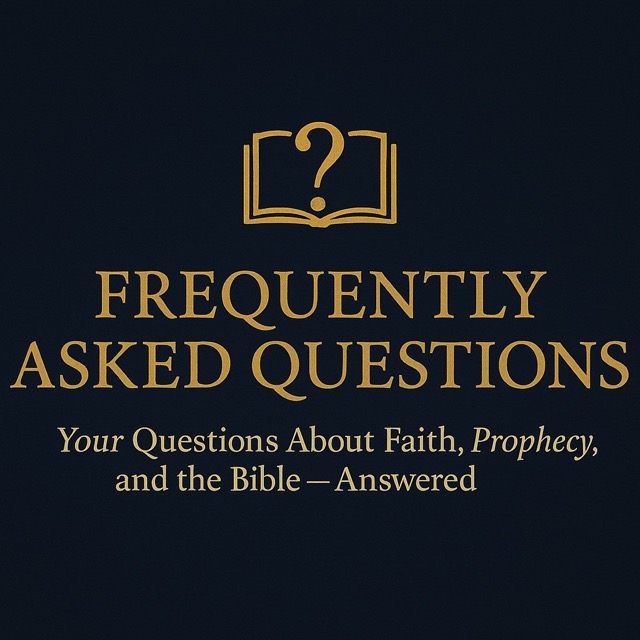
❓ Frequently Asked Questions (FAQ)
📖 Which Old Testament verses explicitly call Jesus “God” or “Everlasting Father”?
Several messianic prophecies describe Jesus with divine titles:
- Isaiah 9:6 calls the coming Messiah “Mighty God” (El Gibbor) and “Everlasting Father” (Avi-ʿad).
- Psalm 45:6 states, “Your throne, O God, is forever,” a verse directly applied to Jesus in Hebrews 1:8.
- Micah 5:2 describes the Messiah’s origins as “from the days of eternity,” pointing to His divine preexistence.
- In the New Testament, Titus 2:13 confirms that Jesus is “our great God and Savior.”
Together, these verses affirm Jesus’ divine identity clearly and repeatedly.
🧑⚖️ How does Psalm 110 reveal Jesus as both divine and priestly?
Psalm 110 offers a unique glimpse into the Messiah’s dual role:
- In verse 1, David writes: “The LORD said to my Lord…” Jesus cites this in Mark 12:36 to assert His divine Lordship.
- Verse 4 declares, “You are a priest forever after the order of Melchizedek.” This is fulfilled in Hebrews 7:17, showing Jesus’ eternal priesthood.
- At Pentecost, Peter quotes Psalm 110 to proclaim Jesus as both “Lord and Christ” (Acts 2:34–36).
This psalm reveals Jesus as exalted King and eternal High Priest — fully divine, yet interceding on behalf of humanity.
✡️ Did the Jewish people expect a divine Messiah?
Historically, most Jewish expectation centered on a human descendant of David. However, some ancient Jewish texts suggest a more divine figure:
- The Dead Sea Scrolls (4Q246) refer to a “Son of God” with cosmic authority.
- Certain rabbinic midrashim speak of a transcendent, supernatural Messiah.
- Scholar Dr. Eitan Bar observes: “Various ancient Jewish sources point to a figure that is God-like… the Messiah was regarded as the Son of God.”
While rabbinic Judaism later emphasized a human-only view, early Christianity understood these texts as clear prophecies about Jesus’ divine identity.
🧠 What does “Wonderful Counselor” mean in Isaiah 9:6?
This title blends supernatural wisdom and divine authority:
- “Wonderful” in Hebrew implies something miraculous or beyond comprehension.
- “Counselor” indicates perfect guidance, justice, and truth.
Jesus fulfills this role through His wisdom-filled teaching (John 7:46) and divine truth (John 14:6). He is not merely wise — He is wisdom incarnate.
👑 How can Jesus be the “Everlasting Father” if He is the Son?
The phrase Avi-ʿad in Hebrew means “Father of Eternity.”
- It emphasizes the Messiah’s eternal reign and protective care — not a confusion of persons within the Trinity.
- Scholars like John MacArthur explain that this title speaks of Christ’s fatherly rule, not His role within the Godhead.
Just as God promises eternal faithfulness in Genesis 17:7, Jesus exercises eternal care as King — fulfilling this father-like role.
🕊️ Why is the Messiah called “The LORD Our Righteousness” in Jeremiah 23:6?
The name Yahweh Tsidkenu means “The LORD is our righteousness.”
- This prophecy declares that the Messiah is not only from God — He is God.
- As Spurgeon preached, “Jesus is Jehovah our Righteousness.”
Jesus fulfills this by living a perfect life and offering His righteousness to believers (Romans 10:4; 1 Corinthians 1:30). He doesn’t just give righteousness — He is our righteousness.
📜 Are there more Old Testament prophecies that affirm Jesus’ divine identity?
Yes — many additional verses point to Christ’s divinity:
- Psalm 45:6–7 – “Your throne, O God…” — applied to Jesus in Hebrews 1:8
- Isaiah 7:14 – “Immanuel” means “God with us”
- Isaiah 43:11 – “There is no Savior besides Me”
- Daniel 7:13–14 – The “Son of Man” receives eternal dominion from the Ancient of Days
Each of these reinforces Jesus’ role as God in flesh — not merely a messenger or prophet.
🧩 What is messianic typology, and how does it relate to Jesus’ identity?
Typology is a pattern in Scripture where an Old Testament person or event foreshadows Christ. Here are key examples:
- Melchizedek (Genesis 14) – A priest-king like Jesus (Hebrews 7)
- David – The shepherd-king pointing to Christ’s rule and care
- Passover Lamb & Scapegoat – Images of Jesus’ atonement and substitution
- Burning bush, Jacob’s ladder – Representations of divine presence fulfilled in Christ
Jesus Himself confirms this in John 5:46: “Moses wrote about Me.” Hebrews 8:5 also affirms these types point to a heavenly reality — namely, Jesus.
🧱 Did early church fathers affirm these prophecies as referring to Jesus?
Yes — early Christian leaders consistently interpreted these prophecies as referring to Christ:
- Justin Martyr, Irenaeus, Athanasius, Augustine all cited Isaiah 9:6, Psalm 2, and Micah 5 to prove Jesus’ divine identity.
- Athanasius, defending the Trinity, called Jesus the eternal Father in the incarnation — not confusing the persons, but affirming His eternal reign.
- Even Jewish sources like the Targum of Isaiah and the Babylonian Talmud (Sanhedrin 99a) show some ancient rabbis saw messianic meaning in these texts.
These voices confirm that from the early church onward, Christians believed that Jesus fulfilled the divine promises of the Old Testament.

